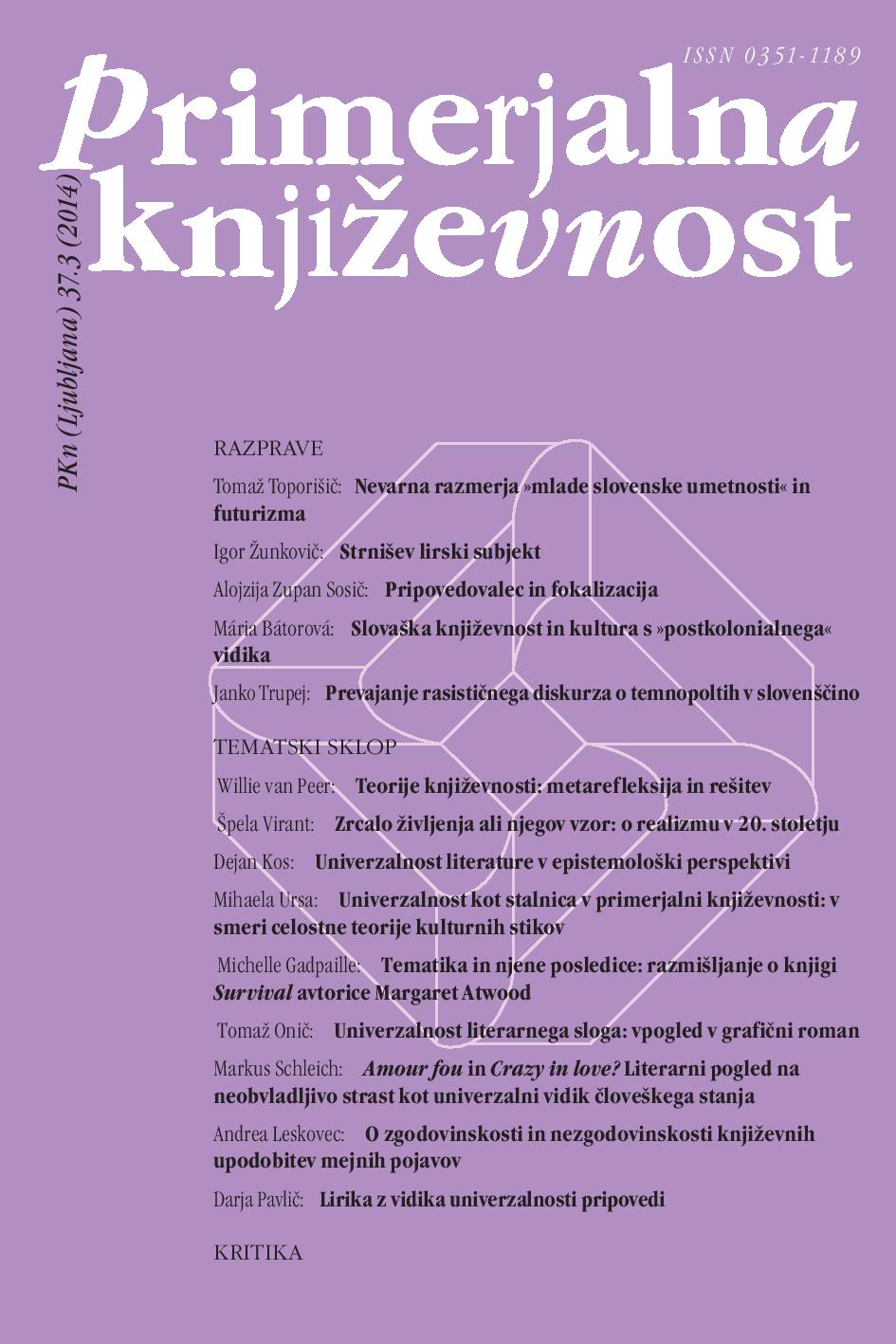Lyric Poetry from the Perspective of Universality of Narration
Keywords:
lyric poetry, event, narration, cognitive narratology, theory of schemes, universals, Bašō, Matsuo, Mallarmé, StéphaneAbstract
Lyric poetry is often understood as a collective concept for non-narrative poetry or poetry without a story, although Hegel already drew attention to the presence of narrative elements in the most subjective literary genre. In his Lectures on Aesthetics, Hegel defined the subject of lyric poetry as the internal world of sentiments, but it could also be an event that, through its content and external characteristics, is epic (e.g., in heroic poems, romances, and ballads) or occasional (as in poems for special events). In both cases¸ it is essential that the basic tone remains lyric; this means that no objective description of an actual event is foregrounded, but the subject’s reflection and his feelings or mood. – In the twentieth century, theorists no longer treated lyric poetry so much as an expression of the poet’s feelings but as a dramatization of the speaker’s spoken thoughts and feelings, and as the literary genre that most strongly expressed linguistic creation. As part of transgeneric narratology, a new approach developed that applied concepts used for analyzing narrative texts to lyric poetry. This article deals with the thesis that narration is a universal semiotic practice that is also characteristic of lyric poetry. Whereas Hegel believed that external events were the subject of lyric poetry in only a few cases (whether epic or occasional), which can be said to belong to the “level of happenings” (i.e., the world of the story), and whereas lyric poetry is often defined as poetry without events at this level, in the typology of the Hamburg researchers (Peter Hühn et al.) events are placed at two additional levels: the level of presentation (discourse) and the level of reading. The reader constructs a story from the events at these three levels, and this process can be explained through the concept of narrativization (Monika Fludernik). The author of this article draws attention to the usefulness of the theory of schemas, frames, and scripts for studying lyric poetry, presents Patrick Colm Hogan’s narrative hypothesis, according to which lyric poems are placed in prototypical narratives, and extends the thesis on the universality of narration to modern lyric poetry. The conclusion suggests that interpretations in which attention is directed to narrativization of poems should also take into account characteristics of style.References
Alber, Jan. »Narrativisation.« Routledge Encyclopedia of Narrative Theory. Ur. David Herman, Manfred Jahn in Marie-Laure Ryan. London: Routledge, 2010.
Culler, Jonathan. Literary Theory. A Very Short Introduction. Oxford: Oxford University Press, 1997. [= Literarna teorija. Zelo kratek uvod. Prev. Marko Cerkvenik. Ljubljana: Krtina, 2008.]
− − −. »Why Lyric?« PMLA 123.1 (2008): 201–206.
Fludernik, Monika. »Allegory, Metaphor, Scene and Expression. The Example of English Medieval and Early Modern Lyric Poetry.« Theory into Poetry. New Approaches to the Lyric. Ur. Eva Müller-Zettelmann in Margarete Rubik. Amsterdam, New York: Rodopi, 2005. 99–124.
Hegel, G. W. F. Vorlesungen über die Ästhetik III. Frankfurt: Suhrkamp, 1970.
Hogan, Patrick Colm. Cognitive Science, Literature, and the Arts: A Guide for Humanists. New York: Routledge, 2003.
− − −. The Mind and Its Stories. Narrative Universals and Human Emotion. Cambridge: Cambridge University Press, 2009 (12003).
Hühn, Peter in Jeans Kiefer. The Narratological Analysis of Lyric Poetry. Studies in English Poetry from the 16th to the 20th Century. Berlin, New York: Walter de Gruyter, 2005. (Narratologia; 7).
Hühn, Peter in Roy Sommer. »Narration in Poetry and Drama.« The Living Handbook of Narratology. Ur. Peter Hühn idr. Hamburg: Hamburg University. Splet 20. 4. 2014. http://www.lhn.uni-hamburg.de.
Hühn, Peter idr., ur. Handbook of Narratology. Berlin: Walter de Gruyter, 2009.
Juvan, Marko. »Žanrska identiteta in medbesedilnost.« Primerjalna književnost 25.1 (2002): 9–26.
Kos, Janko. Očrt literarne teorije. Ljubljana: DZS, 1983.
Mallarmé, Stephane. Knjiga: izbrano delo. Ur. in prev. Marko Crnkovič. Ljubljana: Cankarjeva založba, 1990.
McHale, Brian. »Narrative in Poetry.« Routledge Encyclopedia of Narrative Theory. Ur. David Herman idr. London: Routledge, 2010.
− − −. »Weak Narrativity: The Case of Avant-Garde Narrative Poetry.« Narrative 9.2 (2001): 161–167.
Ogen, Mart, prev. Mala antologija japonske lirike. Ljubljana: Mladinska knjiga, 1975.
Semino, Elena. »Schema Theory and the Analysis of Text Worlds in Poetry.« Splet 23. 8. 2014. http://www.academia.edu/553154/Schema_theory_and_the_analysis_of_text_worlds_in_poetry.
Škulj, Jola. »Spacialna forma in dialoškost: vprašanje konceptualizacije modernističnega romana.« Primerjalna književnost 12.1 (1989).
Wolf, Werner. »The Lyric: Problems of Definition and a Proposal for Reconceptualisation.« Theory into Poetry. New Approaches to the Lyric. Ur. Eva Müller-Zettelmann in Margarete Rubik. Amsterdam, New York: Rodopi, 2005.
Žerjal Pavlin, Vita. Lirski cikel v slovenski poeziji 19. in 20. stoletja. Ljubljana: Založba ZRC, 2008. (Studia litteraria)
− − −. »Naratološki pogled na lirsko pesništvo.« Primerjalna književnost 33.3 (2010): 282–289.


